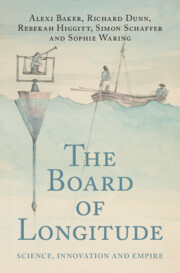
- Coming soon
- Publisher:
- Cambridge University Press
- Expected online publication date:
- July 2025
- Print publication year:
- 2025
- Online ISBN:
- 9781009602556
- Subjects:
- History of Science and Technology, History, Global History

In the first book-length history of the Board of Longitude, a distinguished team of historians of science bring to life one of Georgian Britain's most important scientific institutions. Having developed in the eighteenth century following legislation offering rewards for methods to determine longitude at sea, the Board came to support the work of navigators, instrument makers, clockmakers and surveyors, and assembled the Nautical Almanac. Utilizing the archives and records of the Board, recently digitised by the same team, the authors shed new light on the Board's involvement in colonial projects, Pacific and Arctic exploration, as well as on innovative practitioners whose work would otherwise be lost to history. This is an invaluable guide to science, state and society in Georgian Britain, a period of dramatic industrial and imperial and technological expansion.
‘This volume, based on thorough research, has succeeded in providing a much more rounded picture of the work of the Longitude Commissioners than have previous histories of the subject which have often focused on the role of John Harrison and his marine timekeepers. Both the excellent introduction and the individual essays examine the history behind the creation of the Longitude Commissioners and show that the Board ranged much more widely than the consideration of marine timekeepers. Besides its value to those interested in the history of navigation and exploration, the study examines the gradual expansion of government activity in many areas of innovation.'
Gloria Clifton - Royal Museums Greenwich
‘The path to longitude retains its fascination but, oddly, the Board which oversaw it has lacked a history. This lacuna is amply rectified in this well researched book of essays based on a close scrutiny of the original records. It traverses the beginnings of the Board, its operation and influence and its ultimate demise. Overall, this provides an authoritative account of one of the key institutions which facilitated Britain's long naval and imperial reach.'
John Gascoigne - University of New South Wales
‘The Board of Longitude: Science, Innovation and Empire provides an authoritative account of one of the first state bodies to support innovation and encourage practical solutions to navigational problems. Informed by a forensic engagement with the surviving sources, the authors chart the role of the Board of Longitude in some of the most important technological endeavours of the period. This book offers an invaluable guide for anyone interested in navigating the overlapping commercial, political and scientific imperatives that characterized eighteenth-century Britain.'
John McAleer - University of Southampton
‘This meticulously researched, capacious volume shines a valuable spotlight on Britain's first standing funding body for science and technology. These leading experts have definitively reframed our understanding of the Board of Longitude, the myriad figures who proposed inventive solutions, and the Commissioners who oversaw more than a century of influential contributions to astronomy and navigation.'
Margaret Schotte - York University
 Loading metrics...
Loading metrics...
* Views captured on Cambridge Core between #date#. This data will be updated every 24 hours.
Usage data cannot currently be displayed.